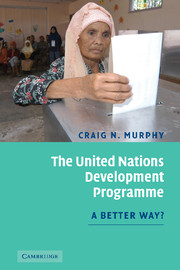Book contents
- Frontmatter
- Contents
- List of figures
- List of tables
- Foreword by Kemal Dervis
- Acknowledgements
- 1 Not the standard image
- 2 Development and the United Nations
- 3 Institutions for practical solidarity
- 4 Decolonization and economic transformation
- 5 Lewis in Ghana and after
- 6 Capacity, consensus, crisis, and consequences
- 7 Engaging liberation movements and revolutionary states
- 8 A learning organization: women, Latin America, and Africa
- 9 ‘Bottoms up’ development helps make UNDP a mammal
- 10 Working for ‘a holy man’ after the cold war
- 11 ‘Fabian socialists do not make the cut’
- 12 ‘Ploughing the sea’? UNDP and the future of global governance
- Index
6 - Capacity, consensus, crisis, and consequences
Published online by Cambridge University Press: 08 January 2010
- Frontmatter
- Contents
- List of figures
- List of tables
- Foreword by Kemal Dervis
- Acknowledgements
- 1 Not the standard image
- 2 Development and the United Nations
- 3 Institutions for practical solidarity
- 4 Decolonization and economic transformation
- 5 Lewis in Ghana and after
- 6 Capacity, consensus, crisis, and consequences
- 7 Engaging liberation movements and revolutionary states
- 8 A learning organization: women, Latin America, and Africa
- 9 ‘Bottoms up’ development helps make UNDP a mammal
- 10 Working for ‘a holy man’ after the cold war
- 11 ‘Fabian socialists do not make the cut’
- 12 ‘Ploughing the sea’? UNDP and the future of global governance
- Index
Summary
More than twenty years separate Arthur Lewis's first public discussion of the lessons he drew from Nkrumah's Ghana (in the mid-1960s) and UNDP's embrace of ‘development as freedom’ in the 1990s. In the first part of that interval, the subject of this chapter, UNDP followed an unexpected path. The 1960s ended and the 1970s began with expectations that international support for economic development, and UNDP's role therein, would grow dramatically in the decades that followed, and a long period of self-assessment – based on that assumption – ended with the agreement among UN members that has governed the Programme since.
‘The Consensus’ – which is how UN offcials refer to this agreement, capitalized and with the definite article – marked a high point of cooperation between the wealthy industrialized countries of the global ‘North’ and the increasingly assertive global ‘South’. The North–South conflict, which became acute in the early 1970s, undermined the assumptions on which UNDP's high expectations in the late 1960s rested. Instead of robust growth, the international development business – especially UNDP – faced financial stagnation. Instead of a global consensus on the means and ends of development, ideological fragmentation and adherence to rigid positions became the norm.
Yet, even in this unexpected context, UNDP proved surprisingly resilient. The Consensus and a set of subsequent reforms moved influence within the Programme away from the Specialized Agencies and their headquarters and towards the field offces, which were often both more practical and more creative than the organization's headquarters in New York.
- Type
- Chapter
- Information
- The United Nations Development ProgrammeA Better Way?, pp. 139 - 169Publisher: Cambridge University PressPrint publication year: 2006



